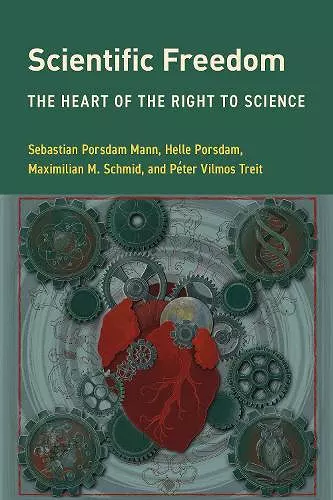Scientific Freedom
The Heart of the Right to Science
Helle Porsdam author Sebastian Porsdam Mann author Péter Vilmos Treit author Maximilian M Schmid author
Format:Hardback
Publisher:Bloomsbury Publishing PLC
Published:16th Jan '24
Currently unavailable, and unfortunately no date known when it will be back

Scientists are supposed to have freedom to choose and conduct their experiments and exchange their ideas. Known as scientific freedom, this idea has been implicated in both wonderful and terrible scientific discoveries. Although it is not new, it has great relevance to contemporary society. In a time of genetic editing, global warming, and a worldwide pandemic, the question of how freely science is and should be conducted is one that has significant practical consequences.
Drawing on rigorous interdisciplinary methods, this book defines the concept of scientific freedom, tells its story, and asks on what basis scientific freedom is best justified. Based on international human rights law and philosophy, the authors develop a model of scientific freedom as a constitutive element of the human right to enjoy the benefits of the progress of science and its applications. To illustrate its usefulness, they then test and apply this model to a real-life and real-time case study, as well as to two highly important international human rights instruments.
Although scientific freedom is clearly at the heart of the right to science as a human right, it is less clear what this freedom entails and how it interacts with other rights and freedoms. This book is the first to provide a very comprehensive and accessible analysis of the historical, theoretical and practical dimensions of scientific freedom. A must-read for professionals and policymakers in this field! -- Yvonne Donders, member, UN Human Rights Committee & professor of international human rights and cultural diversity, University of Amsterdam
This book adds remarkably to the still-young debate on the right to science by highlighting that scientific freedom is the centrepiece of the right to science—as it best guarantees scientific progress. Those who believe that the right to science might usefully be appropriated for purely goal- and priority-based research should read this book to find a better understanding. -- Klaus Beiter, professor of law, North-West University
This nuanced, comprehensive and in-depth reassessment of scientific freedom as a constitutive element of the human right to science comes at the right moment. With a fresh perspective, the authors compellingly frame scientific freedom as a universal cultural human right and highlight its importance for democratic societies. -- Gerd Oberleitner, UNESCO Chair in Human Rights and Human Security, University of Graz
What is scientific freedom, why does it matter, and just as importantly, when must it be limited? These questions are both perennial and utterly timely, and this book dives into them with flair, focus, and a profound commitment to the future of human rights. -- Thérèse Murphy, Queen’s University Belfast
ISBN: 9781538178379
Dimensions: 236mm x 159mm x 23mm
Weight: 517g
220 pages